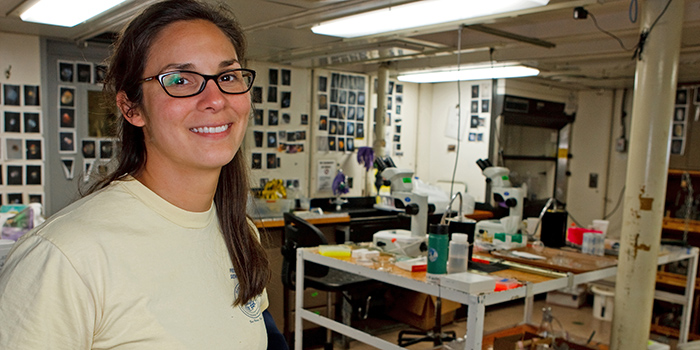
Meet Shawn Arellano
Dr. Shawn Arellano is a Marine Scientist at Western Washington University’s Shannon Point Marine Center in Anacortes, WA.
About the Job
What is your title?
My official title is Marine Scientist.
Where do you work?
I work at Western Washington University’s Shannon Point Marine Center in Anacortes, WA.
Do you travel often? To where?
I travel maybe once a year—either to do research at sea or to a conference somewhere.
What are the educational requirements for your job?
Ph.D. in science with expertise related to the marine environment.
What is the salary range for someone with your type of job?
In academics, salary varies widely depending on individual career stage, the size of the University, where in the country the facility is located, and whether or not the institution is public or private.
How many hours do you work per week?
Most scientists in academia work more than they are required. I probably work up to double the hours that I technically have to.
Job Duties
Tell us about your research and the types of things you do.
My job consists of research, teaching, and undergraduate mentoring. I also advise master’s degree students. My research focuses on how the planktonic lives of babies (larvae) affects adult populations of benthic invertebrates. I work in both coastal environments around Washington state and in chemosynthesis-based environments in the deep sea, like cold seeps and hydrothermal vents.
What is the most fascinating thing you have ever seen or done?
So many fascinating things! Here are some of the top things I can think of right now: 1) Watching embryos develop and larvae move around under the microscope can fascinate me for hours, no matter how many times I have seen them. 2) The Brine Pool cold seep in the Gulf of Mexico is amazing—it’s an underwater lake surrounded by a huge bed of mussels! and 3) I just saw a hydrothermal vent for the first time! That was also amazing.
What are the personal rewards of your work?
I get to go places that few people have ever been (the bottom of the ocean), travel around the world for work (although not very frequently), and meet people from all over the world. And even more rewarding, I get to introduce all the weird things that live in the ocean to students who know very little about life in the sea. It’s fun to see them become amazed by weird sea life and help them carve their paths into science.
How does your work benefit the public?
Besides any basic science information I uncover, I teach undergraduates, work with some citizen science groups, and participate in educational outreach.
What else could someone with your background do?
In Washington state, where I live, there are quite a few marine-related jobs with state, federal, and tribal agencies.
About Shawn
What sparked your initial interest in ocean sciences?
In college I had a work-study appointment in the Biology stockroom, where I would help prepare for lab classes. One of my duties was to feed the animals in the salt-water aquaria. I fed shrimp to the anemones in the tanks and loved to watch them eat—I just thought they were the weirdest little animals. But I didn’t decide to pursue marine science until several years later during my fifth year as an undergraduate student.
Who influenced you or encouraged you the most?
After 3 years in college I went to pharmacy school and realized after about a year that it wasn’t for me. I remembered those weird sea anemones and so I asked Dr. Daphne Fautin at the University of Kansas if I could work in her lab—she’s a sea anemone taxonomist. She was the first person to encourage me to pursue marine science. Dr. Fautin suggested I “get my feet wet” by doing an undergraduate marine science internship on the coast to get a sense of what marine science really is and determine if I might want to pursue a graduate degree in marine biology. Shortly after her words of advice, I did an internship program at the Shannon Point Marine Center (where I work now) where I worked with a new mentor, Dr. Brian Bingham. He was the second person to really encourage me. Dr. Bingham introduced me to marine invertebrate larvae (my favorite!) and his internship program (Multicultural Initiatives in Marine Science: Undergraduate Participation) gave me the courage and all the right tools I needed to pursue a PhD program. Without Dr. Fautin and Dr. Bingham’s encouragement, I would have never ventured down my path out of Kansas and into the deep sea.
Looking back, was there anything you would have done differently in your education or career journey?
First, I would have taken more math classes during my time in college. You can benefit by knowing more about math in nearly every field of science. Second, I may have considered getting a master’s degree before my PhD. Master’s degrees can offer a lot of good job opportunities and if you do decide to go on to a PhD they will also make you much more prepared for your PhD project.
What obstacles did you encounter along the way?
I didn’t encounter any obstacles per se, but I had to be willing to be flexible, move around the country, and persevere even when things weren’t easy.
What are your hobbies?
I like to play with my dogs, garden, exercise, enjoy the outdoors, sew, and play trivia.
Published March 1, 2012